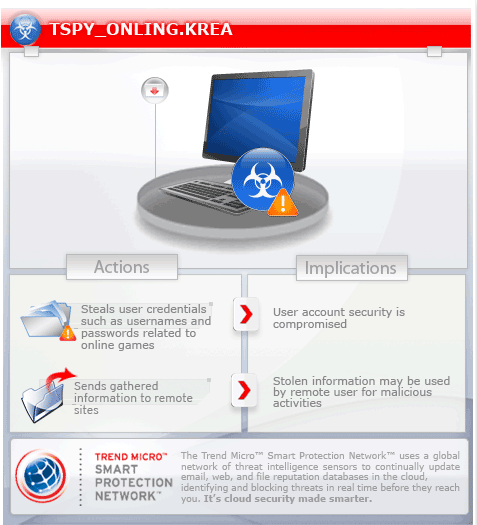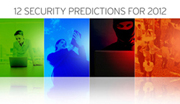TSPY_ONLING.KREA
Trojan/Win32.OnlineGameHack (AhnLab-V3)
Windows 2000, Windows XP, Windows Server 2003


Threat Type: Spyware
Destructiveness: No
Encrypted: Yes
In the wild: Yes
OVERVIEW
This spyware monitors an infected user's browser for a list of Korean gaming sites and steals sensitive user login information.
To get a one-glance comprehensive view of the behavior of this Spyware, refer to the Threat Diagram shown below.

This spyware may be downloaded from remote sites by other malware.
It connects to certain websites to send and receive information.
TECHNICAL DETAILS
89,088 bytes
PE
Yes
26 Jan 2012
Arrival Details
This spyware may be downloaded from remote site(s) by the following malware:
- TROJ_DLOAD.QYUA
It may be downloaded from the following remote sites:
- http://file.{BLOCKED}megirl.com/20120120.exe
Installation
This spyware drops the following files:
- %System%\d3dx9_09.dll - also detected as TSPY_ONLING.KREA
(Note: %System% is the Windows system folder, which is usually C:\Windows\System on Windows 98 and ME, C:\WINNT\System32 on Windows NT and 2000, or C:\Windows\System32 on Windows XP and Server 2003.)
Its DLL component is injected to the following process(es):
- iexplore.exe
Other Details
This spyware connects to the following website to send and receive information:
- {BLOCKED}d.{BLOCKED}p.com
NOTES:
Upon execution, it searches for the legitimate file, %System%\dllcache\imm32.dll. It copies the said DLL as follows:
- %User Profile%\Application Data\{random}.tmp
- %System%\{random}.tmp
It then patches imm32.dll's code to load its dropped component, d3dx9_09.dll, every time the legitimate DLL executes. The patched imm32.dll file is detected as PE_PATCHED.QYUA.
This spyware monitors the Internet Explorer (IE) activities of the affected system, specifically the address bar. It steals user credentials, such as user name and passwords, if a user visits online gaming sites with the following strings in the address bar:
- bm.ndoors.com
- booknlife.com
- eggmoney.kr
- hangame.com
- happyoz.com
- legendofblood.com
- mabinogi.com
- netmarble.net
- plaync.co.kr
- pmang.com
- webzen.co.kr
- www.nexon.com
- baram.nexon.com
- sword.nexon.com
- df.nexon.com
- http://dflogin.nexon.com/login/page/logout.aspxredirect=http://df.nexon.com/?GO=mber/login/al.login_mode=logou-on
- https://login.df.nexon.com/FRM/member/login/al.login_mode=logou-on
The stolen information is then sent to the C&C server, cmd.{BLOCKED}shop.com.
It checks and modifies the priveleges of the following processes if found running in memory:
- lsass.exe
- MalwareScanner.exe
- Virtlogonui.exe
- winlogon.exe
- V3Special.exe
- AyAgent.aye
- dumprep.exe
- ALYac.aye
- dwwin.exe
- irtservices.exe
- V3LTray.exe
- autoup.exe
- V3LRun.exe
- MUpdate2.exe
- SgSvc.exe
- NVCAgent.exe
- V3Light.exe
- vnSkyMon.exe
- V3LSvc.exe
- AYTask.exe
- V3Kill.exe
- AYServiceNT.aye
- SystemMon.exe
SOLUTION
9.200
8.741.00
29 Jan 2012
Step 1
For Windows XP and Windows Server 2003 users, before doing any scans, please make sure you disable System Restore to allow full scanning of your computer.
Step 3
Restart in Safe Mode
Step 4
Search and delete this file
- %User Profile%\Application Data\{random}.tmp
- %System%\{random}.tmp
Step 5
Scan your computer with your Trend Micro product to delete files detected as TSPY_ONLING.KREA. If the detected files have already been cleaned, deleted, or quarantined by your Trend Micro product, no further step is required. You may opt to simply delete the quarantined files. Please check this Knowledge Base page for more information.
Did this description help? Tell us how we did.


